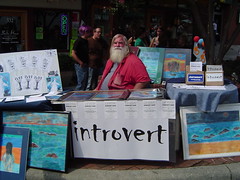In a comment on my previous post, Patrick mentioned that maybe I was a libertarian, and pointed out this blog entry from Andrew Sullivan on the difference between “secularism” and “Christianism” (basically saying that secularism is a fine and grand tradition that is about freedom, not persecution, therefore not an enemy of Christianity at all). The following isn’t directed at the comment (I’m not dumping at Patrick :-) ) … but his comment made me feel like opining …
First, the “secularism” thing: what a lot of liberal/progressive people don’t seem to get is that for over a generation “secular humanism” has been systematically taught as a “religion” within evangelical Christian circles. When I was a teenager and going to “non-denominational” mega-church Sunday school, I heard it said time and again (and read it in the various books I was reading) that secular humanism is, in essence, a religious point of view that worships the human being, and that is actively “anti-God.” That secular humanism’s aim is the eradication of faith in anything other than our own abilities as flesh and blood people. That it was an insidious movement full of conniving, conspiring elitists who were at the forefront of bringing on the age of the Anti-Christ.
No, I am not kidding.
So, I think Sullivan is a little naive on this score. He doesn’t want to see “secularism” stained with the same stigma we now see with “liberalism” — but he doesn’t seem to realize we’re dealing with millions of people who hear “secularism” and react as if you said “Nazism.” Secularism sounds much worse to them than merely “liberal.” They feel that saying our founding fathers were secularists is a revision of history; and that teaching secular values in our schools is essentially breaching the separation of church and state, because to teach it is to deny their children their beliefs in God and Christ.
[Edited to add: upon reading Sullivan’s later posts, I see that others took him to task on this already.]
So, as my folks back home would say, “we got a tough row to hoe.” Overcoming this systematic indoctrination in misinformation is a tall order.
Second, as for libertarianism, there are elements of it that definitely appeal to me. I’m relatively liberal in terms of my politics, I suppose, but I’m not a party-line person, and there are a few bits of conservative thinking I tend to agree with as well as libertarian thinking. For example, I agree government should leave us alone as much as possible. That is, government should not initiate interference in our lives unless it’s necessary for the public good. And even then, only when absolutely necessary.
But what is necessary? I think that’s where I differ from a lot of libertarians. I think it’s necessary that the country provide opportunity to even the most downtrodden. By opportunity, I mean helping to remove barriers to improving their lives, not necessarily subsidizing the continuation of their current state. Much harder to do than to say, I realize, but that takes government.
I believe in having excellent infrastructure within which individuals and communities can thrive. But I don’t think it works to leave that up to the grass roots or the “rugged individual” — it takes government too. People like to point to Bill Gates and other success stories and say “they earned their money, they should be able to keep it” but without an infrastructure supported by a strong federal system these companies wouldn’t have had a chance to exist.
Also, I believe in the idea of public education. It’s an important part of socializing citizens into the national fabric, and requiring our children to grow up literate is essential to having an informed public. Without that, the Constitution simply wouldn’t work.
Basically, I’m not a believer in the idea that if you just leave the “market” alone, it will do everything right, or that smaller government is always good. It took government to keep the Union together during the Civil War. It took government to break apart monopolies and trusts, and to create better working conditions, and to enforce civil rights (a little late in the game, but better late than never).
I do think, however, that huge government programs should only be created if they include baked-in limits on themselves. That is, huge programs should, whenever possible, make themselves obsolete by actually solving problems and not just covering them over. I do think we have layer upon layer of inefficient band-aid stuff in government that people get used to and take for granted. (Much like people say that “under God” in the Pledge of Allegiance is “an American tradition” when it’s only about 60 years old.) I agree there’s a lot of waste. Some of it, unfortunately, is just going to be there no matter what we do — there’s noise in any human system. But government is absolutely necessary, and sometimes it has to be big to save its citizens from chaos, oppression, and despair. It’s our responsibility as the people who comprise our own government to keep it in check, though, and shrink it back down when we can. I suppose that’s a conservative value? But I don’t know any liberals who would disagree with this essential premise.




